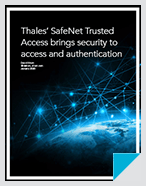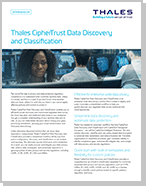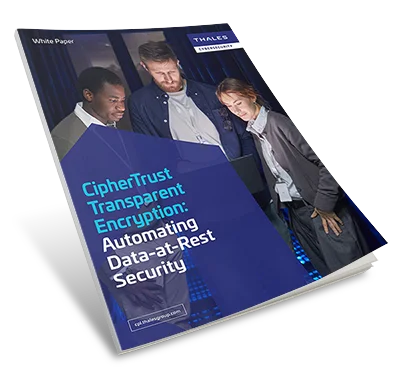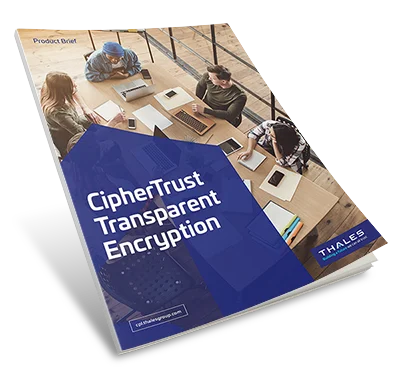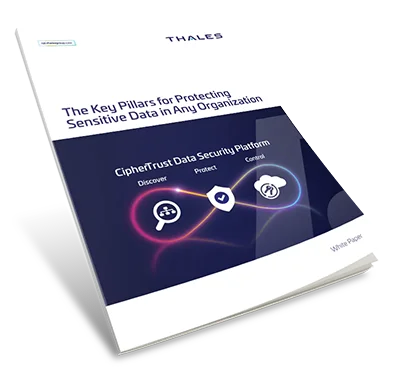Compliance summary
Complying with Mexico’s Data Protection Law (Ley Federal de Protección de Datos Personales en Posesión de los Particulare) and avoiding fines and breach notifications requires state-of-the-art best-practice data security.
Thales’ offerings in this area include:
- Data discovery and classification to identify and classify according to risk sensitive data wherever it resides in your organization
- Strong access management and authentication to ensure only credentialed users can retrieve the data
- Data-centric protection that ensures that if data is stolen, it is meaningless and therefore useless to cybercriminals
- Security intelligence logs to identify irregular access patterns and breaches in progress
Data Discovery and Classification
The first step in protecting sensitive data is finding the data wherever it is in the organization, classifying it as sensitive, and typing it (e.g. PII, financial, IP, HHI, customer-confidential, etc.) so you can apply the most appropriate data protection techniques. It is also important to monitor and assess data regularly to ensure new data isn’t overlooked and your organization does not fall out of compliance.
Thales’ CipherTrust Data Discovery and Classification efficiently identifies structured as well as unstructured sensitive data on-premises and in the cloud. Supporting both agentless and agent-based deployment models, the solution provides built-in templates that enable rapid identification of regulated data, highlight security risks, and help you uncover compliance gaps. A streamlined workflow exposes security blind spots and reduces remediation time. Detailed reporting supports compliance programs and facilitates executive communication.
Strong access management and authentication
Thales Access Management and Authentication solutions provide both the security mechanisms and reporting capabilities organizations need to comply with data security regulations. Our solutions protect sensitive data by enforcing the appropriate access controls when users log into applications that store sensitive data. By supporting a broad range of authentication methods and policy driven role-based access, our solutions help enterprises mitigate the risk of data breach due to compromised or stolen credentials or through insider credential abuse.
Support for smart single sign on and step-up authentication allows organizations to optimize convenience for end users, ensuring they only need to authenticate when needed. Extensive reporting allows businesses to produce a detailed audit trail of all access and authentication events, ensuring they can prove compliance with a broad range of regulations.
Protection of sensitive data at rest
The CipherTrust Data Security Platform is an integrated suite of data-centric security products and solutions that unify data discovery, protection, and control in one platform.
- Discover: An organization must be able to discover data wherever it resides and classify it. This data can be in many forms: files, databases, and big data, and it can rest across storage on premises, in clouds, and across back-ups. Data security and compliance starts with finding exposed sensitive data before hackers and auditors. The CipherTrust Data Security Platform enables organizations to get complete visibility into sensitive data on-premises and in the cloud with efficient data discovery, classification, and risk analysis.
- Protect: Once an organization knows where its sensitive data is, protective measures such as encryption or tokenization can be applied. For encryption and tokenization to successfully secure sensitive data, the cryptographic keys themselves must be secured, managed and controlled by the organization. The CipherTrust Data Security Platform provides comprehensive data security capabilities, including file-level encryption with access controls, application-layer encryption, database encryption, static data masking, vaultless tokenization with policy-based dynamic data masking, and vaulted tokenization to support a wide range of data protection use cases.
- Control: The organization needs to control access to its data and centralize key management. Every data security regulation and mandate requires organizations to be able to monitor, detect, control, and report on authorized and unauthorized access to data and encryption keys. The CipherTrust Data Security Platform delivers robust enterprise key management across multiple cloud service providers (CSP) and hybrid cloud environments to centrally manage encryption keys and configure security policies so organizations can control and protect sensitive data in the cloud, on-premise and across hybrid environments.
- Monitor: Finally, the enterprise needs to monitor access to sensitive data to identify ongoing or recent attacks from malicious insiders, privileged users, APTs, and other cyberthreats. CipherTrust Security Intelligence logs and reports streamline compliance reporting and speedup threat detection using leading Security Information and Event Management (SIEM) systems. The solution allows immediate automated escalation and response to unauthorized access attempts and provides all the data needed to build behavioral patterns required to identify suspicious usage by authorized users.
Protection of sensitive data in motion
Thales High Speed Encryptors (HSEs) provide network independent data-in-motion encryption (Layers 2,3 and 4) ensuring data is secure as it moves from site-to-site, or from on-premises to the cloud and back. Our HSE solutions allow customers to better protect data, video, voice, and metadata from eavesdropping, surveillance, and overt and covert interception—all at an affordable cost and without performance compromise.
Protection of cryptographic keys
Luna HSMs from Thales provide a hardened, tamper-resistant environment for secure cryptographic processing, key generation and protection, encryption, and more. Available in three FIPS 140-2 certified form factors, Luna HSMs support a variety of deployment scenarios.
In addition, Luna HSMs:
- Generate and protect root and certificate authority (CA) keys, providing support for PKIs across a variety of use cases
- Sign your application code so you can ensure that your software remains secure, unaltered, and authentic
- Create digital certificates for credentialing and authenticating proprietary electronic devices for IoT applications and other network deployments

 The law requires data controllers to have in place appropriate administrative, technical and physical safeguards to ensure the protection of personal data.
The law requires data controllers to have in place appropriate administrative, technical and physical safeguards to ensure the protection of personal data.